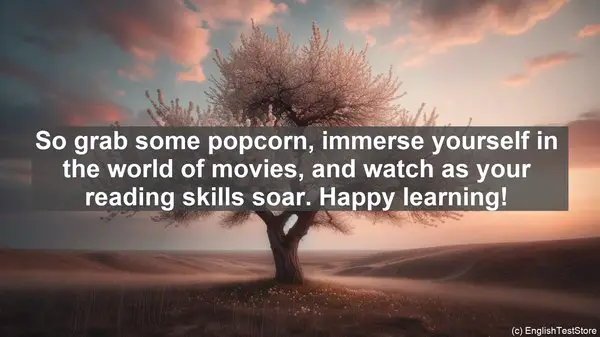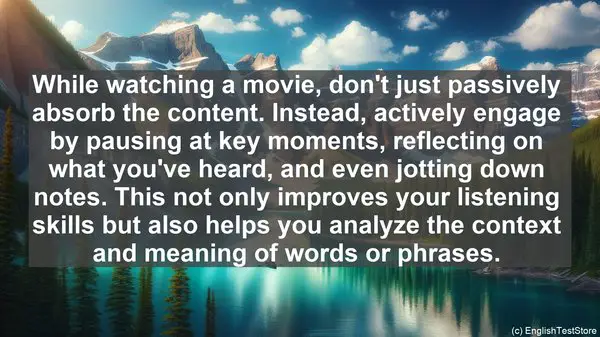Introduction: The Power of Movies in Language Learning
Welcome to today’s lesson. Movies have always been a popular form of entertainment, but did you know that they can also be a powerful tool for language learning? In this video, we’ll explore how English movies, when used strategically, can greatly enhance your reading skills, especially for the TOEFL iBT exam. So let’s dive in!
1. Choose Movies with Subtitles
When starting out, it’s best to select movies that have English subtitles. This way, you can follow along with the dialogue, making it easier to understand and grasp new vocabulary. As you progress, you can gradually switch to movies without subtitles, challenging yourself to rely more on your listening and reading skills.
2. Active Listening: Pause and Reflect
While watching a movie, don’t just passively absorb the content. Instead, actively engage by pausing at key moments, reflecting on what you’ve heard, and even jotting down notes. This not only improves your listening skills but also helps you analyze the context and meaning of words or phrases.
3. Predicting: A Valuable Skill
As you watch a movie, try to predict what might happen next. This not only keeps you engaged but also hones your reading skills. Often, the dialogue, actions, or even the setting can provide clues. Over time, you’ll find that your ability to anticipate events or understand subtle hints improves significantly.
4. Post-Movie Analysis
After watching a movie, take some time to analyze it. What was the main theme? Who were the key characters? What were their motivations? This kind of analysis not only enhances your reading comprehension but also helps you develop critical thinking skills, which are crucial for the TOEFL iBT exam.
5. Vocabulary Building: Beyond the Dictionary
Movies offer a treasure trove of vocabulary. When you come across an unfamiliar word, don’t just reach for the dictionary. Instead, try to understand its meaning from the context. How is it used? What emotions or actions does it convey? This way, you not only learn the word but also its nuances and usage.

6. Genre Exploration: Diversify Your Exposure
While it’s tempting to stick to your favorite genre, exploring different types of movies is essential. Each genre has its own vocabulary, style, and themes. By diversifying your movie choices, you expose yourself to a wider range of language, making your reading skills more adaptable and versatile.
7. Group Discussions: Collaborative Learning
Movies are meant to be shared experiences. After watching a movie, discuss it with your peers or join online forums. This not only enhances your speaking skills but also provides different perspectives and insights. You’ll be amazed at how a simple movie can spark deep and meaningful discussions.
8. Simulating Exam Conditions: Time Management
The TOEFL iBT exam is not just about reading comprehension; it’s also about time management. To simulate exam conditions, set a timer and try to answer questions related to the movie within the given time. This helps you develop the necessary speed and accuracy required for the actual test.
9. Cultural Immersion: Beyond Language
Movies are windows into different cultures. Pay attention to the customs, traditions, and social dynamics depicted in the movie. This not only enriches your understanding of the language but also prepares you for the cultural aspects that might be tested in the TOEFL iBT exam.

